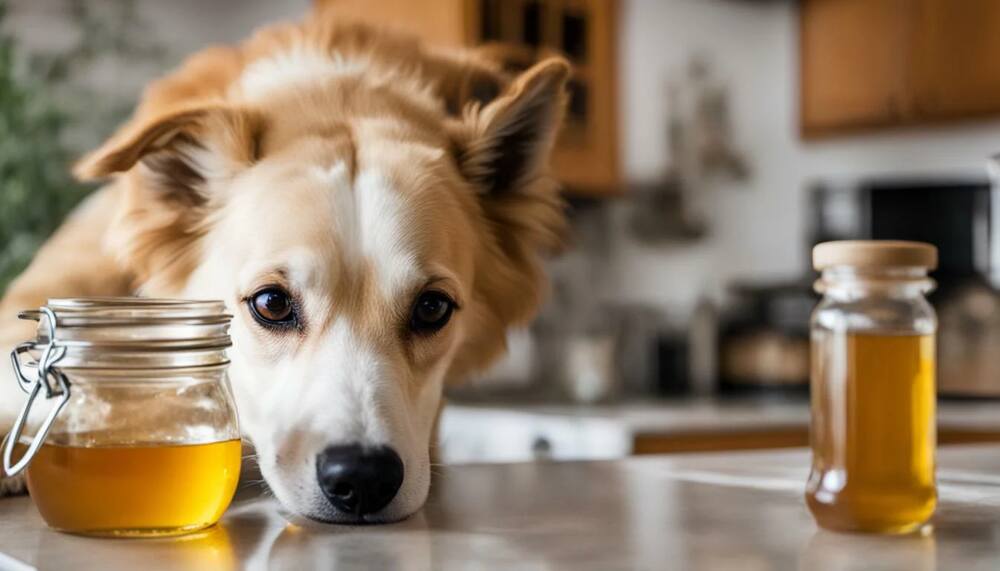
Can Dogs Eat Honey? The Sweet Truth
Can dogs eat honey? Many dog owners wonder if honey is safe for their furry friends. Honey is a natural sweetener that many people enjoy. It has some health benefits for humans, but what about dogs? The good news is that honey can be safe for dogs to eat in small amounts. It is not toxic and can even have some advantages for them.
Honey contains vitamins and minerals, which can be good for dogs. However, it is essential to be careful. Too much honey can lead to problems like upset stomach or diarrhea. Just like with any treat, moderation is the key. Let’s explore more about honey and how it can fit into your dog’s diet.

Health Benefits of Honey for Dogs: Can Dogs Eat Honey
Honey is not just sweet; it has some health benefits too! Here are a few ways honey can help dogs:
- Natural Energy Booster: Honey is full of natural sugars. This can give your dog a quick energy boost when needed.
- Soothing for Coughs: Some dog owners use honey to help soothe their dog’s cough. It can help calm an irritated throat.
- Allergy Relief: Honey may help with allergies. It contains small amounts of pollen, which can help dogs build immunity to local allergens.
While honey can be beneficial, it’s important to consult with your veterinarian before adding it to your dog’s diet. Every dog is different, and what works for one may not work for another.
How to Safely Introduce Honey to Your Dog’s Diet: Can Dogs Eat Honey
If you’re considering giving honey to your dog, it’s best to start slow. Here’s how you can safely introduce honey:
- Start with a Small Amount: Begin with just a little bit, like half a teaspoon, and see how your dog reacts.
- Watch for Allergies: Keep an eye on your dog for any allergic reactions. Signs can include itching or upset stomach.
- Mix it with Food: You can mix honey into your dog’s food or give it as a treat. Just make sure it does not replace their regular meals.
Always remember that honey should only be a small part of your dog’s diet. Treats should not make up more than 10% of their daily calories.
Nutritional Benefits of Honey for Dogs: Can Dogs Eat Honey
Honey contains several beneficial nutrients that can be good for dogs in moderation, including:
- Vitamins and Minerals: Honey is rich in vitamins such as B vitamins and minerals like calcium and potassium.
- Antioxidants: Honey contains antioxidants that can help fight free radicals in the body.
- Energy Source: The natural sugars in honey provide a quick energy boost, making it a great treat for active dogs.
Potential Health Benefits of Honey for Dogs
In addition to its nutritional content, honey can offer various health benefits for dogs, including:
- Allergy Relief: Local honey may help dogs with seasonal allergies by exposing them to small amounts of pollen.
- Wound Healing: Honey has antibacterial properties that can assist in healing minor cuts and burns when applied topically.
- Soothing Coughs: Honey can be a natural remedy for coughs and sore throats, acting as a soothing agent.
How to Safely Introduce Honey to Your Dog’s Diet: Can Dogs Eat Honey
If you decide to give your dog honey, follow these tips for safe introduction:
- Start Small: Begin with a small amount, like half a teaspoon, to see how your dog reacts.
- Monitor for Reactions: Watch for any signs of allergies or digestive upset, such as vomiting or diarrhea.
- Mix with Food: You can mix honey with your dog’s food or use it as a treat to make it more appealing.
Recommended Serving Sizes of Honey for Dogs: Can Dogs Eat Honey
Moderation is key when it comes to feeding honey to dogs. Here are some guidelines:
- Small Dogs: 1/2 teaspoon per day.
- Medium Dogs: 1 teaspoon per day.
- Large Dogs: 1 to 2 tablespoons per day.
Precautions When Feeding Honey to Dogs: Can Dogs Eat Honey
While honey is generally safe, there are some precautions to take. Here are important things to remember:
- Age Matters: Puppies under one year old should not eat honey. They can be more sensitive to certain foods.
- Sugar and Weight: If your dog is overweight or has diabetes, it’s best to avoid honey. Too much sugar can worsen these conditions.
- Raw Honey Warning: Some types of honey, like raw honey, can contain bacteria that might be harmful. Always choose pasteurized honey.
Being aware of these precautions can help keep your dog healthy and safe while enjoying this sweet treat.
Sweet Alternatives to Honey for Dogs: Can Dogs Eat Honey
If you’re looking for alternatives to honey, there are plenty of dog-safe options. Here are some delicious and healthy alternatives:
- Pumpkin Puree: Packed with fiber, pumpkin puree can be a tasty addition to your dog’s diet.
- Peanut Butter: Dogs love peanut butter! Just make sure it does not contain xylitol, which is toxic to dogs.
- Carob Chips: These are a chocolate substitute safe for dogs. They can be used in homemade dog treats.
These alternatives can add variety to your dog’s treats while keeping their diet healthy and fun.
Conclusion: Can Dogs Eat Honey
In conclusion, the answer to “Can dogs eat honey?” is yes, but with care. Honey can be a safe and beneficial treat for dogs when given in moderation. It offers health benefits, including energy boosts and allergy relief. However, always consult with your veterinarian before introducing honey to your dog’s diet.
Remember to monitor your dog for any adverse reactions and use honey as an occasional treat, not a staple. With the right approach, honey can be a sweet addition to your dog’s life!
FAQs: Can Dogs Eat Honey
Q: Is honey safe for dogs?
A: Yes, honey is safe for dogs in small amounts.
Q: Can puppies eat honey?
A: No, puppies under one year old should not eat honey.
Q: What are the benefits of honey for dogs?
A: Honey can boost energy, soothe coughs, and help with allergies.
Q: How much honey can I give my dog?
A: Start with half a teaspoon and watch how your dog reacts.
Q: What should I do if my dog has an allergic reaction to honey?
A: If you notice itching or upset stomach, stop giving honey and consult your vet.
Q: Are there any alternatives to honey for dogs?
A: Yes, pumpkin puree, peanut butter (without xylitol), and carob chips are great alternatives.
